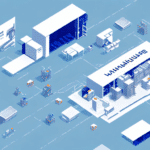Optimizing Shopify Warehouses: Locus Robotics vs 6 River Systems
In the competitive landscape of e-commerce, efficient warehouse automation is pivotal for swift and accurate order fulfillment. The advancement of robotics technology has transformed warehouse operations, with Locus Robotics and 6 River Systems emerging as leading innovators. This article offers an in-depth analysis of the warehouse robotics market and provides a comprehensive comparison of Locus Robotics and 6 River Systems, focusing on their products, speed, efficiency, customer satisfaction, cost, integration with Shopify, and practical applications. We will also explore potential advancements from these companies and discuss the future outlook of the warehouse robotics industry.
Warehouse Robotics Market Overview
The warehouse robotics market has experienced significant growth, driven by the escalating demand for efficient order fulfillment in the e-commerce sector. Valued at $3.442 billion in 2020, the market is projected to expand at a compound annual growth rate (CAGR) of 11.5% from 2021 to 2026.1 Key factors fueling this growth include the rising need for automation in warehouses and advancements in artificial intelligence (AI) and machine learning.
Warehouse robotics enhances operational efficiency and productivity by automating repetitive and time-consuming tasks, allowing human workers to focus on more complex and valuable activities such as quality control and customer service. This shift not only boosts overall warehouse efficiency but also improves job satisfaction and employee retention.
Despite its benefits, the adoption of warehouse robotics presents challenges, including significant initial investment costs, the necessity for specialized technical skills to operate and maintain the robots, and potential job displacement for human workers. To mitigate these challenges, companies must conduct a thorough cost-benefit analysis and implement comprehensive workforce training and transition plans.
Comparing Locus Robotics and 6 River Systems
Company Background
Locus Robotics and 6 River Systems, both headquartered in Massachusetts, specialize in advanced warehouse automation solutions. Established in 2015, Locus Robotics has developed a fleet of autonomous mobile robots designed to collaborate with human workers, thereby enhancing productivity and accuracy in warehouse operations. Similarly, 6 River Systems, founded in 2015, offers a cloud-based platform that integrates mobile robots with machine learning and AI to optimize warehouse fulfillment processes.
Both companies have successfully deployed their solutions across various industries, including retail, e-commerce, and healthcare. Locus Robotics has partnered with global logistics leaders like DHL and GEODIS to streamline their warehouse operations. On the other hand, 6 River Systems collaborates with prominent companies such as Shopify and Office Depot to enhance their fulfillment processes.
Product Offerings and Capabilities
Locus Robotics offers several products, including the LocusBot, a collaborative mobile robot capable of picking and transporting products within the warehouse. They also provide the LocusBots Conveyor, a mobile conveyor system designed to move products between different warehouse locations. Additionally, Locus Robotics offers a cloud-based management system that optimizes robot workflow and integrates seamlessly with existing warehouse management systems.
6 River Systems features the Chuck, a mobile robot equipped with advanced sensors and cameras that navigate the warehouse and avoid obstacles while picking and transporting products. Their cloud-based 6RS Fulfillment Platform utilizes machine learning algorithms to streamline warehouse workflows and reduce order processing times.
Beyond their primary offerings, both companies enhance warehouse operations with additional capabilities. Locus Robotics supplies a variety of accessories for the LocusBots, such as different grippers and attachments tailored for handling diverse product types. They also provide comprehensive training programs for warehouse staff to effectively operate and maximize the use of the robots.
6 River Systems introduces features like "Pick to Light", which employs illuminated guides to direct warehouse workers to the correct products and locations for picking. This feature can be integrated with the Chuck robot to further refine the picking process. Additionally, their "Collaborative Picking" feature enables multiple Chuck robots to work in tandem, enhancing efficiency within the warehouse.
Speed and Efficiency Comparison
Both Locus Robotics and 6 River Systems offer substantial improvements in speed and efficiency over traditional manual operations. A study by Auburn University found that Locus Robotics' mobile robots can boost productivity by up to 2.5 times and reduce labor costs by as much as 80%.2 Conversely, 6 River Systems reports that the Chuck robot can enhance productivity by up to 2.2 times and decrease training time for new employees by up to 90%.3
However, the effectiveness of these solutions depends heavily on the specific warehouse layout and the nature of the products handled. In certain scenarios, one system may outperform the other based on these variables.
Customization and flexibility are additional key differentiators. Locus Robotics' solutions are highly customizable, facilitating seamless integration with existing warehouse management systems and workflows. In contrast, 6 River Systems' Chuck robots offer greater flexibility, allowing them to adapt to dynamic warehouse layouts and varying product types.
Support and service are crucial for successful implementation. Locus Robotics provides a dedicated customer support team along with on-site training and installation services. Similarly, 6 River Systems offers on-site training, installation, and continuous support through its customer success team. The quality of support can significantly influence the success of a warehouse automation deployment.
User Reviews and Customer Satisfaction
Customer satisfaction ratings for both Locus Robotics and 6 River Systems are notably high. On G2, Locus Robotics holds a 4.9 out of 5 rating based on 25 reviews, while 6 River Systems maintains a 4.6 out of 5 rating from 47 reviews.4 Users commend both systems for their ease of use, flexibility, and significant impact on warehouse efficiency.
Distinct differences emerge upon closer examination. Locus Robotics is lauded for its advanced AI capabilities, enabling the system to adapt to evolving warehouse environments and optimize performance continuously. On the other hand, 6 River Systems is praised for its intuitive user interface and straightforward implementation process, making it especially appealing to smaller warehouses or those with limited technical expertise.
Regarding customer support, Locus Robotics is recognized for its hands-on approach, offering dedicated account managers and on-site support during the implementation phase. In contrast, 6 River Systems adopts a more self-service model, providing extensive documentation and online resources to assist users.
Cost Comparison
The investment required for implementing warehouse robotics varies based on factors like warehouse size, the number of robots needed, and the chosen solution. Both Locus Robotics and 6 River Systems offer flexible pricing tailored to each customer's specific requirements. According to Supply Chain Dive, the total cost for deploying Locus Robotics ranges from $500,000 to $2 million, while 6 River Systems' implementation costs span from $500,000 to $3 million.5
While the initial costs may appear substantial, the long-term savings can be significant. Automation reduces labor costs and enhances productivity, delivering a strong return on investment. Additionally, both companies provide ongoing support and maintenance services to ensure their systems operate efficiently over time.
Integration with Shopify
Seamless integration with e-commerce platforms like Shopify is essential for efficient order fulfillment. Both Locus Robotics and 6 River Systems offer integration capabilities through APIs and third-party systems. Locus Robotics touts a full integration with Shopify achievable within 6-8 weeks, whereas 6 River Systems' integration process may require more time due to the complexity of its platform.
Real-World Applications in Shopify Warehouses
Both Locus Robotics and 6 River Systems have been successfully implemented in Shopify's warehouses. For instance, at Shopify's New Jersey facility, Locus Robotics' mobile robots have contributed to a 300% increase in order throughput.6 Meanwhile, 6 River Systems' Chuck robots at Shopify's Ohio warehouse have led to a 200% increase in productivity and significantly reduced training time for new employees.
Future Outlook and Potential Advancements
The future of the warehouse robotics market appears promising, with continued adoption of automation solutions expected to drive growth. Locus Robotics and 6 River Systems are poised to remain at the forefront of this expansion through ongoing innovation and product enhancements. Potential advancements include:
- Enhanced AI and Machine Learning: Further integration of AI to optimize warehouse workflows and predictive maintenance.
- Advanced Robot Designs: Development of new robot configurations to better accommodate diverse warehouse layouts and product types.
- Increased Scalability: Solutions that can easily scale with the growing demands of e-commerce businesses.
- Improved Integration Capabilities: Enhanced compatibility with a broader range of e-commerce platforms and warehouse management systems.
In conclusion, choosing between Locus Robotics and 6 River Systems depends on the specific needs and operational requirements of each warehouse. Both companies offer robust solutions that significantly enhance efficiency and productivity, supported by high customer satisfaction ratings. By evaluating the factors discussed, warehouse operators can make informed decisions to select the most suitable automation partner.




















